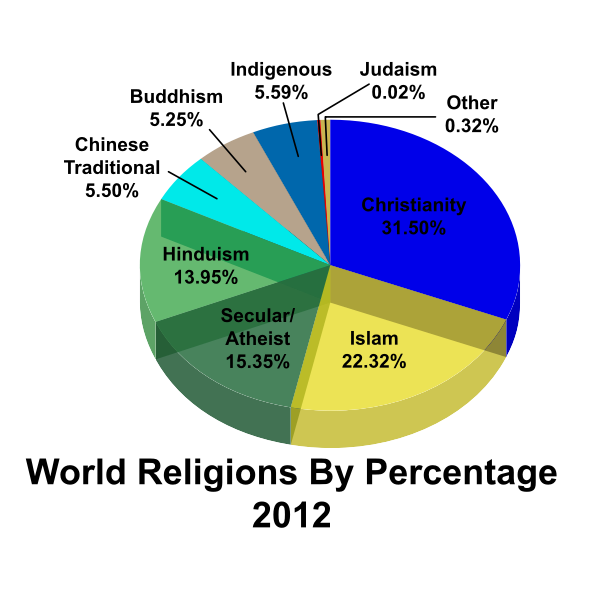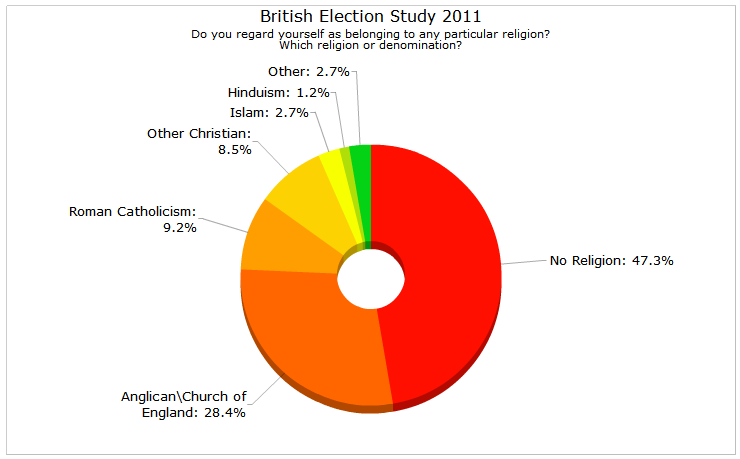

You’ve said this study was the result of both personal interest and professional curiosity. UVA Today caught up with Sen and Draughon to learn more. Recently, Sen, a demographer at the University of Virginia’s Weldon Cooper Center for Public Service, and Draughon, a UVA religious studies graduate student, took a deep dive into the demographics of religion in Virginia. The questions had long intrigued Shonel Sen and Rebecca Draughon.
#Religion percentages plus#
The margin of sampling error is plus or minus 2 percentage points at the 95% confidence level, Gallup says.What role does geography play in determining a region’s religious characterization? Are individuals more likely to live in a certain location if they practice a particular religion? Does the assumption that major metro areas are more likely to harbor diverse religious communities hold true? The interviews were conducted by telephone from 2018 to 2020. Gallup says it compiled the survey from interviews of 6,117 randomly sampled adults in all 50 states and the District of Columbia.

"While it is possible that part of the decline seen in 2020 was temporary and related to the coronavirus pandemic, continued decline in future decades seems inevitable, given the much lower levels of religiosity and church membership among younger versus older generations of adults," it states. far fewer, now less than half, have a formal membership with a specific house of worship." In conclusion, Gallup states that though the "U.S. But people who said they "prioritize religion" in their lives were more likely to say their faith had grown stronger. "The limited data Gallup has on church membership among the portion of Generation Z that has reached adulthood are so far showing church membership rates similar to those for millennials," Gallup said.Ī Pew Research Center survey conducted last summer, as the coronavirus pandemic raged, showed that 3 in 10 Americans reported stronger personal faith due to the pandemic.

adult population with people in younger generations who are less likely to belong."Įven with those declines, 66% of traditionalists, 58% of baby boomers, 50% of those in Generation X and 36% of millennials said they belong to a church, synagogue or mosque. However, Gallup points out that demographic shifts, not a sudden disaffection among the religious, appear to account for much of that change, "with those in older generations who were likely to be church members being replaced in the U.S. "Since the turn of the century, there has been a near doubling in the percentage of traditionalists (from 4% to 7%), baby boomers (from 7% to 13%) and Gen Xers (11% to 20%) with no religious affiliation," Gallup says. adults said they belonged to a church, synagogue or mosque. That figure fluctuated only a few percentage points over a period of six decades beginning in 1937 - the first year of the survey - when 73% of U.S. In 2018, 50% of adults polled said they belonged to a religious congregation, down sharply from the 70% who said so as recently as 1999. While membership in a house of worship fell only slightly in the latest survey, which was conducted in part during the coronavirus pandemic, the results reflect a trend that Gallup has been tracking since the turn of the century. has fallen to just 47% among those surveyed - representing less than half of the adult population for the first time since Gallup began asking the question more than 80 years ago. The new Gallup poll, published Monday, indicates that religious membership in the U.S. adults say they belong to a church, synagogue or mosque, according to a new Gallup survey that highlights a dramatic trend away from religious affiliation in recent years among all age groups. Randy Vazquez/Digital First Media/The Mercury News via Getty Imagesįewer than half of U.S. A new Gallup survey finds that those professing church membership has fallen 18 percentage points among Catholics since 2000. Raymond Catholic Church in Menlo Park, Calif., in February. Michael Amabisco blesses ashes during an Ash Wednesday service at St.


 0 kommentar(er)
0 kommentar(er)
